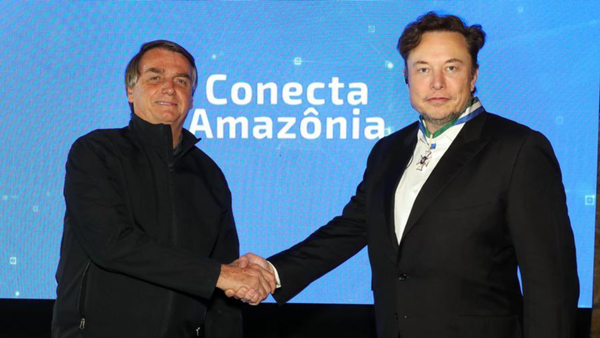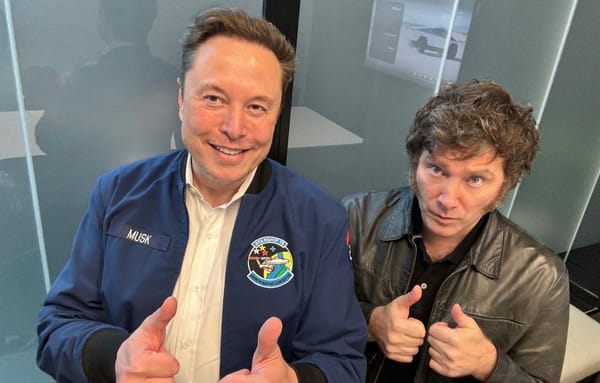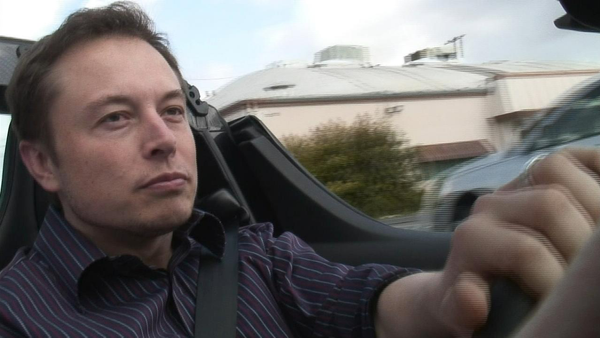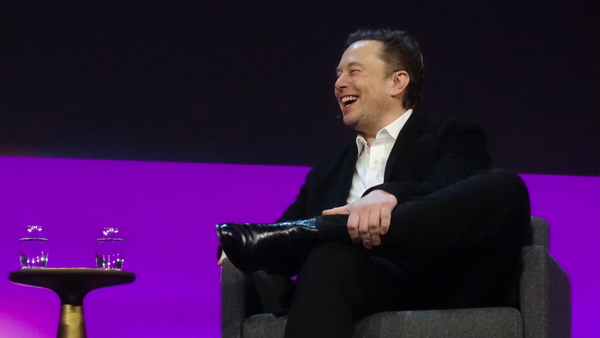Roundup: Elon Musk's China links and Microsoft's misleading merger arguments
Read to the end for another worrying aspect of proliferating AI tools

Happy Sunday! In this week’s roundup, I decided to dig deep on two big topics: whether we should be concerned about Elon Musk’s connections to China, and Microsoft’s ongoing campaign to get its massive merger with Activision Blizzard approved. They’re both important in their own ways, and I think will be part of the public conversation for years to come — for very different reasons, of course. Plus, I have some recommended links and news updates near the end, as usual.
This is also the last free roundup before they become a perk for paying subscribers in March. So, if you’ve been enjoying the analysis in these updates, consider upgrading so you can keep getting them into the future. Thank you!
Is Elon Musk in China’s pocket?
MSNBC host Mehdi Hasan did a segment this week on Elon Musk’s connections to China. It presents a lot of instances of Musk’s contacts with Chinese officials, his business relationships in China, and how he’s been unwilling to criticize the Chinese government even as he frequently blasts the Democrats in the United States. While I think it’s insightful, I have serious problems with how the segment frames these details, and since I’m sure we’ll be hearing more about it in future, I decided to unpack some of the arguments.
Before I do that, I want to premise this section by saying that I don’t want this to seem like I’m trying to attack Mehdi personally; I just happen to disagree with this segment. MSNBC is a network I don’t care for, feel is stacked with Democratic Party hacks, and profits from using Donald Trump in a reality TV-style way to keep viewers watching. But I think Mehdi is one of the good ones and often does great, critical segments on topics that don’t get enough attention in US media. I’ve been following his work since his days hosting UpFront on Al Jazeera, where he challenged his (powerful) guests in ways you rarely see on news programs.
So, with that said, the framing of this segment was off for me. In particular, I feel that presenting these facts about Musk to play up his closeness with China and contrast it with his criticism of US Democrats aids the ongoing effort by the US national security establishment to get the public on board with a US-China conflict, or “New Cold War,” as it’s often framed. Elon Musk is not some CCP puppet or communist sympathizer; he’s an incredibly narcissistic billionaire who seeks out opportunities for personal praise and business success — and that explains his actions toward China, and many other countries for that matter.
It’s not news that Elon Musk is a hypocrite on his “free speech absolutism”; Twitter has been banning left-wing accounts, including at his request. It’s also not a surprise that he would criticize the United States while ignoring China. He’s always been very responsive to things he perceives as personally affecting him, as US policies do, but that’s less the case with China, where he doesn’t live. We’ve also seen his US political allegiances shift because while the Democrats would once praise him for his efforts with Tesla and SpaceX (while supplying him with ample public contracts and subsidies), that’s no longer the case. Yet, the Republicans are happy to praise him, offer him financial benefits, not threaten him with new taxes, and allow him to trample over laws he doesn’t like as long as he’ll play along with their culture war bullshit. It’s no wonder his allegiances have shifted — and Democrats should further discredit him, not try to win him back.
I’d also argue he doesn’t much care when people are harmed — whether in China or anywhere else — if doesn’t affect him personally. Look at how he treats his workers — Tesla’s Fremont factory was dubbed the “plantation” for the pervasive racism experienced by Black workers — and his comments that “We will coup whoever we want” in response to the overthrow of Bolivian president Evo Morales, let alone the fact that part of his family wealth came from an emerald mine in Zambia. He loves Chinese workers because they work longer hours and he perceives them to be less likely to push back against corporate abuse, not because of a particular affinity for China. Tesla has also been accused of using cobalt connected to child labor, but you don’t see Musk speaking out about that either. Instead, he signed a bigger contract with Glencore, whose sites were accused of using child labor.
“Here is a man who knows how to speak truth to power, as long as it’s not Chinese,” says Mehdi in the segment. But that leaves out how Musk has long been close with the murderous Saudis, even relying on their money to take Twitter private last year after previously trying to get them to help him take Tesla private. The Saudis ran an intelligence operation through Twitter, and who knows what they’re up to now. He’s also been very close with Russian officials, not just since the war, but long before that when he tried to buy rockets from Russia for SpaceX. In 2021, he even invited Vladimir Putin for a conversation on Clubhouse, saying, “It would be a great honor to talk to you.”
Elon Musk is a terrible man and a well-known hypocrite. But that doesn’t mean we need to paint him as having a particular affinity for China to play into a growing narrative of US-China rivalry by questioning whether Musk is deferential enough to US political leaders — who themselves are hardly benevolent figures — and too friendly toward the Chinese. The tech industry has long courted the Chinese market — Tim Cook is still trying to balance Apple’s reliance on China with growing US Sinophobia, while Mark Zuckerberg has flipped from learning Mandarin and asking President Xi Jinping to name his first child to playing up anti-China narratives because it helps blunt calls for antitrust action and the competition Meta faces from TikTok.
Ultimately, heightening the tensions between the United States and China will not only be great for the military-industrial complex that needed to find a new reason for additional military spending after the end of the war in Afghanistan (before Russia invaded Ukraine), but it will also be great for the tech industry. Its Chinese competitors will be hurt by sanctions from the United States and potentially other Western countries, and the move will justify an increase in military spending that will go into tech development. As Malcolm Harris explains in Palo Alto: A History of California, Capitalism, and the World, the tech industry has profited from arms manufacturing from the beginning — and this time will be no different. Elon Musk, as a massive military contractor, will surely get in on the spending too.
I interviewed Malcolm Harris on Tech Won’t Save Us and we discussed that part of the industry’s history. You can listen here.
Microsoft’s misleading EU show
It’s been over a year since Microsoft announced its intention to buy Activision Blizzard for $68.7 billion in the midst of a wave of scandal over sexual harassment, union-busting, and mistreatment of workers at the game studio. This past week, the effort continued as Microsoft took its PR game to Brussels to campaign for the deal’s approval by putting on a show for the press and rolling out a bunch of agreements that appear to address regulators’ concerns, but in practice don’t really do that.
In its press briefing, Microsoft Vice Chairman Brad Smith pulled out an envelope and waved around a contract, saying, “I walk around with an envelope that contains the definitive agreement that we sent to Sony two days before Christmas, I am ready to sign it at any time.” Sony is one of the biggest opponents of the acquisition, for obvious reasons: it would give its major competitor a significant competitive advantage, not through its own ingenuity but simply by buying up third-party game studios.
The contract promises to keep Activision Blizzard games on Sony’s Playstation consoles for ten years, but that’s not the full issue. Opponents of the deal are concerned about how such a significant acquisition would increase Microsoft’s market power and what it would mean if Activision Blizzard’s titles became Xbox-exclusive, yet there’s also the issue of where the industry goes next: if it’s really moving toward subscriptions and cloud services rather than buying individual games and playing them on consoles or PCs, the industry is going to look very different and buying one of the biggest gamemakers could further increase the advantage Microsoft has in dominating that market. It already has a massive cloud infrastructure and, as one of the most valuable publicly traded companies in the world, has a lot of money to throw around.
For that reason, the deals it announced with Nintendo and Valve to bring Call of Duty and other Activision Blizzard games to Nintendo consoles and Steam don’t address those concerns. They’re about offering the games for purchase, but Microsoft envisions a future where gamers buy fewer games and instead sign up for a monthly subscription. (Despite what Microsoft once claimed, it admitted in filings to the UK regulator that its Game Pass service does reduce the sales of games included in its library.) Microsoft also signed a deal with Nvidia to put Activision Blizzard titles in its GeForce Now cloud streaming service. On its face, this might appear to address that concern, but in an incredibly insightful analysis at GamesIndustry.biz, Rob Fahey explains
GeForce Now is not a game subscription service, or in any way a competitor to Microsoft's Game Pass, but is rather a way to rent a powerful gaming PC in the cloud and use it to play software you personally own by installing it from digital distribution storefronts. […] Crucially, it is not a concession that in any way assuages concerns about Game Pass' potential dominance of the game subscription market.
Microsoft’s hope is that regulators don’t recognize the difference. Games by Activision Blizzard and Microsoft-owned Bethesda Softworks were previously available in GeForce Now before the companies pulled them. “What Microsoft has conceded to Nvidia, then, is really just a restoration of the former status quo,” writes Fahey.
There’s another element of this too: it’s still early days for game subscription services, and it’s hard to say whether they’ll take over in the way Microsoft hopes. But, if they do, a ten-year agreement won’t mean much if soon after Xbox Game Pass gets some serious competition, it can pull back some of the industry’s biggest franchises and make them exclusive to its service thanks to this acquisition. It’s like Disney acquiring Marvel, Star Wars, and Fox properties, then pulling its content from Netflix to get people onto its own streaming service — but video streaming is much more competitive than game streaming, despite still being dominated by a small number of major players.
Sony is dominant in console gaming, and has been for a long time, but that’s not a reason to brush aside opposition to this major acquisition. Microsoft isn’t competing on those terms, but trying to alter those terms so they’ll be more favorable to its competitive advantages — namely, having cloud infrastructure and a ton of cash. As Fahey explains,
Sony's entire market cap is just north of $100 billion, so not that much larger than the money Microsoft will have spent buying game publishers and developers by the time this deal closes, which means that this acquisition spree really is bringing a rocket launcher to a knife fight, in financial terms.
Where does this go next? Christopher Dring thinks Microsoft’s display may be enough to win over EU regulators, but the whole episode — especially some comments by people at Activision Blizzard — could make their case to UK regulators (who are very focused on competition in the subscription market) more difficult. If it goes through, the repercussions for the games industry will be significant.
I interviewed Rob Zacny on Tech Won’t Save Us about the wider consequences of this acquisition last year. You can listen here.
Recommended reads
Peter Yeung went to Indonesia, which supplies 48% of global nickel and where the industry is rapidly expanding to keep up with demand for electric vehicles. The “clean” solution to our transport problem is creating a wave of environmental and social harm including respiratory problems, poor safety standards, low pay, and pollution. “Whatever profits this brings in, it won’t be enough,” said Aulia Hakim, the head of a regional branch of Indonesia’s largest green group. “We can’t save the planet by destroying it.”
Erik Ravenscraft broke down the New York Times’ irresponsible and factually incorrect coverage of “metaverse real estate.” “Carrying water for investors and grifters is apparently more important than accurately informing its readers,” he explained.
Mihir Dalal has a fascinating story about Flipkart, its competition with Amazon in India, and what happened after it was acquired by Walmart (as part of its effort to challenge Amazon in ecommerce).
Ben Tarnoff writes about the dilemma of the social software engineer and the politics embedded in our technological heritage. People trying to develop better tech are fighting not just against the bosses of today, but “against the ghosts of bosses past, the ones who bequeathed them their technological tools.”
Sam Biddle explains how Google is helping Saudi Aramco greenwash its business.
Timnit Gebru was profiled in the Wall Street Journal to discuss her perspective on what tech companies are doing with AI and her history in the industry.
Ernie Smith digs into whether ChatGPT is really going to upended search engines, and reminds us a lot of people said the same thing about WolframAlpha in 2009.
Labor watch
- Meta is planning another big round of job cuts.
- Visual effects workers say the CGI on Ant-Man and the Wasp: Quantumania looks so bad because Marvel Studios was more focused on Black Panther: Wakanda Forever and made a lot of last-minute changes that left VFX workers with 80-hour weeks.
- The Writer’s Guild of America will begin contract negotiations on March 20 as the industry prepares for a possible strike. One of their main concerns are residuals from streaming services.
- The Communication Workers of America have come out in favor of the Activision Blizzard acquisition after signing a neutrality agreement with Microsoft. While it might be good for the union’s organizing efforts in the short term, it seems to ignore the long-term consequences of greater industry consolidation.
In other news
- AI-generated stories are flooding the submission boxes of science fiction magazines. Clarkesworld’s Neil Clarke explained it’s being driven “by ‘side hustle’ experts making claims of easy money with ChatGPT.”
- Sam Bankman-Fried’s political donations are under growing scrutiny. A political consultant told him to give to “a lot of woke shit for transactional purposes.”
- Search engines powered by generative AI are going to have a big carbon footprint.
- It looks like you won’t be able to copyright AI-created images.
- Warner Bros is planning new Lord of the Rings movies. They haven’t learned the story’s lesson about delving too greedily in search of riches.
- “Move fast and break things” is moving to a planetary scale as a geoengineering company launches balloons filled with sulfur dioxide without FAA permission. Maybe the US should stop the hysteria over Chinese and hobbyist balloons and do something about these ones instead.
- On Tech Won’t Save Us, I spoke to Rosie Collington, co-author of The Big Con, about how outsourcing tech to the private sector leaves governments unable to deliver for the public or to properly assess new technologies.
A final video
Joseph Cox posted this video of him using an AI voice program to access his bank account over the phone. Yet another challenge these tools will present that the companies developing them have given little thought to. Move fast and break things.





